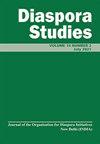移民转型的特殊性:以亚美尼亚移民为例
IF 0.5
Q4 DEMOGRAPHY
引用次数: 2
摘要
本文提出了研究苏联解体后从前后苏联空间演变而来的散居者变化的方法论,以及基于该方法论的研究成果。文章借鉴了亚美尼亚侨民的情况下,这被认为是古典或历史侨民。本文认为,在散居侨民的演变过程中,其补充条件的变化影响了其性质和特征。形成同一流散的社区之间甚至可能出现显著差异。因此,有必要对构成同一流散的社区进行比较分析。文章提出了一个四阶段的模型,分期的亚美尼亚侨民。它建议用转型类型的散居来补充科恩提出的散居者分类。这将使我们能够更准确地描述近三十年来在散居者中发生的发展,这些发展源于后苏联时代的转型,以及旧世界秩序的崩溃和新秩序的形成。本文章由计算机程序翻译,如有差异,请以英文原文为准。
Peculiarities of transforming diasporas: the case of the Armenian Diaspora
ABSTRACT The article proposes the methodology of studying the changes in diasporas evolved from the former post-Soviet space after the collapse of the Soviet Union, as well as the results of the research based on this methodology. The article draws upon the case of the Armenian Diaspora, which is considered as classical or historical diaspora. It is argued that during the evolution of diasporas, the changes in the prerequisite for their replenishment affect their nature and characteristics. Even significant differences may arise between the communities forming the same diaspora. Thus, there is a need to make a comparative analysis of the communities forming the same diaspora. The article presents a four-stage model of periodization of the Armenian Diaspora. It proposes to supplement the classification of diasporas suggested by Cohen with the transforming type of diaspora. This will allow for more accurate description of the developments taking place in diasporas for almost three decades, resulting from the post-Soviet transformation, as well as the collapse of the old world order and formation of a new one.
求助全文
通过发布文献求助,成功后即可免费获取论文全文。
去求助
来源期刊

Diaspora Studies
DEMOGRAPHY-
CiteScore
1.40
自引率
10.00%
发文量
18
期刊介绍:
Diaspora Studies is the interdisciplinary journal of the Organisation for Diaspora Initiatives (ODI) and is dedicated to publishing academic research on traditional diasporas and international migrants from the perspective of international relations, economics, politics, identity and history. The journal focuses specifically on diasporas and migrants as resources for both home and host countries. The scope of the journal includes the role of diasporas and international migration as important drivers in international relations, in development, and within civil societies. The journal welcomes theoretical and empirical contributions on comparative diasporas and state engagement policies, and aims to further scholarship and debate on emerging global networks and transnational identities. Diaspora Studies publishes: 1. Reviewed research papers 2. Book reviews 3. Conference reports 4. Documents on diaspora policies
 求助内容:
求助内容: 应助结果提醒方式:
应助结果提醒方式:


